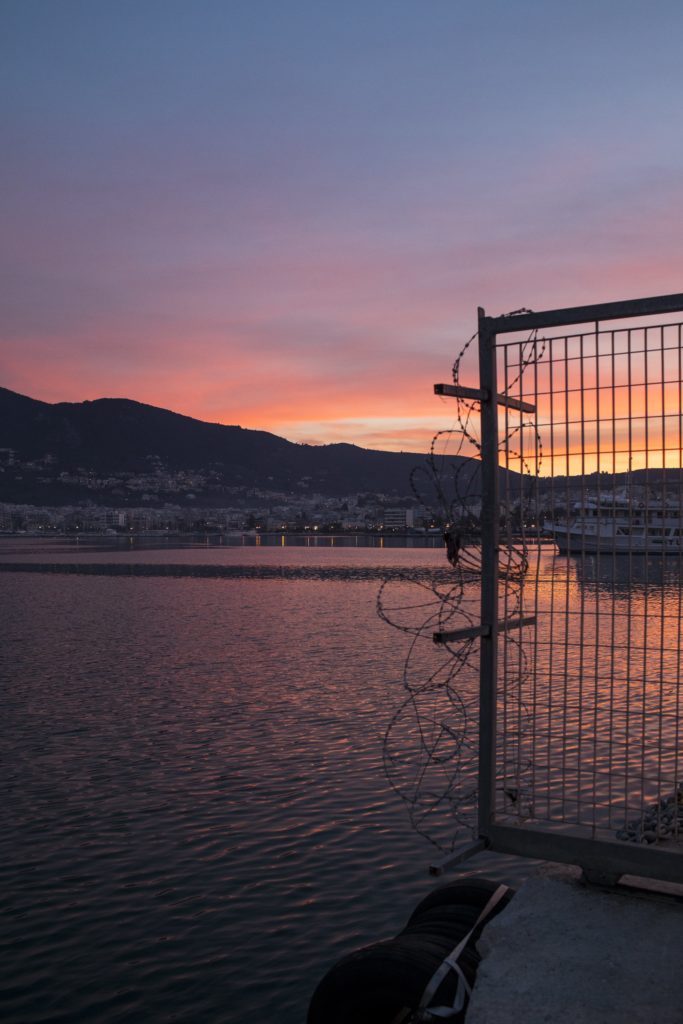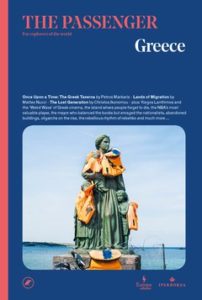
In Life as in Mythology, Greece is a Place of Frustrated Migrations
Matteo Nucci on Odysseus, the Greco-Turkish War, and the Plight of Modern Refugees
“I sing of arms and the man who of old from the coasts of Troy came, a refugee of fate, to Italy and the shore of Lavinium.”
–Virgil
*
The most famous of the ancient refugees who took to the sea from the shores of Asia Minor was Aeneas.
We cannot say with any certainty from where he—along with his father, his son and dozens of survivors of the sack of Troy—set sail. Visiting the famous city, besieged by the Achaeans for ten years before it fell thanks to Odysseus’ wooden horse, we struggle to see the sea on the horizon. Although its power had grown through trade—its position almost guarding the Dardanelles—Troy was never a maritime city. The land surrounding the defensive walls—which Heinrich Schliemann announced he had identified in 1872—has certainly changed over the centuries.
The Scamander—the river in which Achilles massacred the Trojans after taking up arms again to avenge Patroclus—is now just a trickle known to the Turks as the Karamenderes, a name with no legendary significance. Today, the plain where the warriors’ bodies were buried is an expanse of fields that stretch anonymously towards the wine-dark sea; there is no invitation to visit, no signs, and the little roads that run across the landscape form a labyrinthine grid.
When you arrive at the strip of sand, amid the fierce silence of the waves beating against the shore, it is hard to imagine that this was where the Achaean ships once anchored. Black tree trunks litter the beach among plastic refuse, bottles and scraps of clothing left by those who have taken to the sea. Strange metal constructions have been built by families seeking shade in summer. No one mentions the modern migrants.
Not far from the shore, or so it seems, is an island known as Bozcaada that now belongs to Turkey but which the Greeks have always called Tenedos. It gives the impression of being close enough to protect any boat that sets sail, but the reality is very different—if you are unprepared the sea will show no mercy. And yet you will have this same feeling, that of an enclosed and protective sea, everywhere along the coast of Asia Minor.
Let’s turn around the southern tip of the region known in antiquity as the Troad, beyond present-day Babakale. In Virgil’s account, when Aeneas left the shores where he had grown up in a prosperous city with high hopes for the future, with an auspicious birthright (as the son of Aphrodite and a distant cousin of Hector, the ablest of King Priam’s children), rather than setting out from the coast opposite Tenedos he left from a town called Antandros, the port the Trojans used for their timber trade.
Aeneas did not set sail for Lesbos . . . as people do today in large, unbelievably overcrowded rubber dinghies.
Today, only a few stones remain of Antandros. Much more interesting is Assos, a few kilometres away, where Aristotle came to live for two years just after Plato’s death in 347 BCE. There the great thinker occupied himself mainly with scientific research. He found a wife, made some good friends and met Theophrastus, who became a loyal collaborator, and he lived contentedly, not least because it was so easy to visit the island facing the town with his friends and colleagues. It is so close that on fine days you can see the coast so clearly it is as if you could reach out and touch it.
 From The Passenger: Greece. © Pietro Masturzo, by arrangement with Prospekt Photographers.
From The Passenger: Greece. © Pietro Masturzo, by arrangement with Prospekt Photographers.
Even then Lesbos was an island with a rich history. It was said that the head of Orpheus had washed up on its shores after he was killed by women driven to fury by his rejection of their advances. Orpheus, the legendary poet who almost succeeded in bringing his wife Eurydice back to life and who, after seeing her disappear for eternity into the dark of Hades, decided to devote himself exclusively to music. Perhaps it was the singing head of Orpheus that endowed Lesbos with the lyrical magic that achieved glory in the immortal poetry of Alcaeus and Sappho; and perhaps it was the lake-like calm of the sea that inspired the Trojans to venture out and abandon their homeland.
Aeneas did not set sail for Lesbos, however, as people do today in large, unbelievably overcrowded rubber dinghies, united in their certainty that the Greek shore is but a stone’s throw away. Aeneas eventually arrived in Rome; for modern migrants just reaching Europe would be enough. Crossing the imaginary border drawn in the sea just off the Turkish coast is the decisive step.
The majority of the thousands of asylum seekers who have arrived on Lesbos in the past few years have left Turkey from these same beaches. Between Antandros and Assos, evading the ever-tightening surveillance of the border forces, those who do not drown first land somewhere near Skala Sikamineas, a little village nestling in a magnificent fishing harbor. From the taverna, which is open year-round, even on the coldest days, and named after a local poet, it seems impossible to imagine shipwrecks in this flat expanse barely eleven kilometers across.
“You can drown a few meters from the shore,” an old fisherman bent over his nets tells me. “All it takes is panic, some vicious rocks and little waves that can seem insurmountable when you’re in the water. The sea is harsh everywhere, but on land things can sometimes be worse. Why risk so much if you’re going to have to stop here?”
In these few sentences he had summed up the drama that has played out here in recent years. Drama is an ancient Greek word formed from the verb drao, which means to act. Drama is action. Because any action, any decision, brings suffering. Yet nothing creates more terrible suffering than being unable to act, and that is what has been happening on the islands off the Turkish coast since March 2016, when the highly contested agreement between the EU and Turkey decreed that the people who had risked death to get there would have to stay there.
I was in Idomeni at the time that may one day go down in history as the worst turn on the road towards the destruction of the European dream. Idomeni is a little village of 150 people on the northern border of the Greek province of Macedonia, 80 kilometers from Thessaloniki. Its position on the railway line, during the months when thousands of migrants were traveling the so-called Balkan route to northern Europe, was crucial. It even became famous in a way when some Balkan nations within the EU gradually closed their borders (against EU regulations that forbid this happening between member states), forcing their diminutive neighbor, then known as the Former Yugoslav Republic of Macedonia (since 2019, following a long-running dispute with Greece, simply the Republic of North Macedonia), to follow suit and block the passage of those who had got to that point.
A double chain-link fence was hastily erected along the border, and the police were armed with rifles loaded with rubber bullets and tear gas while thousandsof refugees clustered around the now defunct railway tracks. According to official estimates, the settlement that grew up during those months became home to more than 15 thousand human beings. For the most part Syrians fleeing a ruinous war, Afghans, Kurds and Iraqis, they found themselves trapped, forced to live in whatever tents they could muster, surrounded by mud. This was an absurd situation that would have become untenable without the assistance provided by NGOs and volunteers.
Back then we had not yet understood that the enormity of what was happening would lead Europe, under German guidance, to seek an agreement with Turkey that would previously have been difficult to imagine. A complex deal that is still subject to challenges because it is not on the list of legally recognized international treaties. Above all, it is a deal with devastating consequences for the flow of migrants across the Greek sea because, as all observers know, it has created a sort of internal border within Greece that is entirely alien to any legal or rational norm, one that prevents people from leaving the islands off Asia Minor and moving freely through Europe, except in cases where the long process for recognition of refugee status reaches a positive conclusion.
The Greeks threw themselves into the water in an attempt to reach the ships and were pushed back by those who ought to have brought them to safety.
But in those days of the emergency in Idomeni, people had their minds on other things. Walking around in the evenings between the fires outside the shelters was a moving experience. While a few kids had found friends to play with, the parents were preparing food, and the youngsters were gathered at the meeting points to charge their phones. You would hear heartrending tales and possibly also horrific legends, such as that of the Greek doctor who had provided passage through the mountains for some unaccompanied young children but had allegedly then sold them on to organ traffickers.
But there were also beautiful stories, and one of them rightly became celebrated. It was about an elderly local woman who opened the doors of her house every day to those in need, offering them a shower, a little rest, some peace and quiet. Just a drop in the ocean but one with extraordinary symbolic significance. Panagiota Vasileiadou, 82 years of age, told the journalists who gradually arrived to interview her that she herself was the daughter of refugees, and that she had personally felt the weight of tragedy, a tragedy that no Greek can claim to have forgotten even though it now appears distant and almost lost amid the many absurdities of the 20th century.
It was September 13th, 1922 when the final Catastrophe took place in Smyrna (modern Izmir). Katastrophi. This is still how people remember the end of the Greco-Turkish war, which also signaled the end of an entire civilization. The coasts of Asia Minor had been home to Greek peoples since the Iron Age, the days of Aeneas, and even before Aeneas. Then, in 1919, almost a century after Greek independence from the Turks, who had dominated Hellenic territory since 1453, the Greeks tried to take back what they had never stopped regarding as theirs.
The Megali Idea, the Great Idea, proposed a restoration of the territorial integrity of the Byzantine Empire and reconquering the Polis—as it is still called by Greeks—the city of Constantine, better known to us as Istanbul. The capital would have been moved from Athens to Constantinople, and many Turkish lands would have returned to Greek control. The great powers that Greece had sided with during the First World War did not offer the promised support, however. The words of Great Britain and France turned out to be empty, and Kemal Atatürk revealed himself to be an extremely astute strategist.
In 1922 the Turkish counter-offensive vanquished the Greek contingents, which had almost reached Ankara, and the end of the Great Idea was sealed by the great fire of Smyrna, the elegant and cultured Greek city that is now the Turkish city of Izmir. One of the young reporters who described the atrocities of those tragic days would become perhaps the most influential American writer of the 20th century: Ernest Hemingway.
While the Greeks threw themselves into the water in an attempt to reach the ships and were pushed back by those who ought to have brought them to safety, the American was struck by what was at first sight an incidental detail, and it became the epilogue to one of his best-known short stories. In “On the Quai at Smyrna” (first published in the 1930 edition of In Our Time) he depicts the fleeing Greeks breaking the forelegs of those pack animals they were unable to take with them and dumping them in the water, the whole scene being, in his words, “a most pleasant business.”
Hemingway’s minimalist irony is an attempt to avoid rhetoric in a situation where it could be employed by the ton. The end of Greek civilization on the shores of Asia Minor led to a monstrous migration. As well as those who fled the flames of Smyrna or Turkish persecution, thousands of families were involved in a dramatic exchange of populations in an attempt at pacification that remains unstable even today. The Greeks in Greece and the Turks in Turkey. But how can you define the culture of peoples who have been intermingled for so long?
 From The Passenger: Greece. © Pietro Masturzo, by arrangement with Prospekt Photographers.
From The Passenger: Greece. © Pietro Masturzo, by arrangement with Prospekt Photographers.
Religion was the key: Christians over here and Muslims over there. More than 1.5 million people abandoned everything and took to the sea, carrying with them what they could. Some stopped on the islands off the Turkish coast—Lesbos, Chios, Samos and Kos—but most migrated to Piraeus, the port of Athens, or maybe to the port of Thessaloniki. It was a disturbing exodus, a movement of people with profound consequences for 20th-century Greece. And yet those displaced people who suffered terrible conditions and died of hunger and exhaustion in their thousands (around 70 thousand) were never denied the opportunity to leave, to seek elsewhere the future that had been taken away from them in Asia Minor.
Never before on the islands off the coast of Asia Minor—in other words, in the original heart of the very idea of Europe—had a plan been hatched to stop the flow of migrants. Never. And perhaps this is why recently, outside the shacks and the tent cities, outside the improvised encampments and the cabins thrown up by NGOs, I so often saw Greek women and men hard at work lending a hand without show, without self-aggrandizement, without fuss.
Perhaps we should go back to Odysseus, that other migrant, who was forced to roam the Mediterranean for ten years before he could reach home.
The old lady in Idomeni was not a unique case wheeled out for the press. And it was not only those who had experienced the migration of 1922 at first hand who offered their help. Wherever the migrants were stopped in their search for dignity—in the districts that had actually sprung up in Chios to accommodate people displaced from Smyrna, beside Vathy’s cemetery on Samos, in the fields outside Mytilene on Lesbos—I always felt I could detect a bewildered look on the faces of people witnessing families who had left everything and were forced into inertia with no idea of how their future would take shape.
And, along with this bewilderment, a human propensity that is absolutely unique in these days of growing obsession with national sovereignty, racism and the collapse of solidarity, something related to the word for foreigner, xenos—but, rather than the familiar term xenophobia, its exact opposite, philoxenia, friendship towards strangers.
This, too, is an ancient story. In Greece there are no stories that have completely lost their connection with the dimension from which they originated, because myths, stories and events have entered and shaped the DNA of the people. Perhaps we should go back to Odysseus, that other migrant, who was forced to roam the Mediterranean for ten years before he could reach home. There was a decisive moment during his adventures. The Homeric poets describe it entirely without grandiloquence, perhaps with the same literary and human intentions that inspired Hemingway almost three millennia later.
It was the morning that Odysseus found himself shipwrecked on the island of the Phaeacians. After sleeping in the bushes, dirty and naked, the hero emerges on to a beach where some girls are playing with a ball. It is a wonderful, unexpected scene. Princess Nausicaa stays while her companions run away screaming. She talks to the stranger with composure and explains what he should do to be welcomed by her parents.
Sure enough, following the girl’s instructions Odysseus finds himself at Alcinous’ table shortly afterwards without ever being asked his name, what he is doing, what he wants and where he is going. These were the key rules of the institution that the ancients simply knew as xenia. Because while xenos meant foreigner, above all it meant guest. And xenia was, very simply, the duty of hospitality to be shown to foreigners when they arrived with no bad intentions.
You will see for yourself if you arrive as an ordinary traveler, unannounced, in a village in Greece or the regions of southern Italy known to the Romans as Magna Graecia because of their populations of Greek settlers. You are unlikely to want for company or not to meet someone who offers you a glass of water and invites you to pull up a chair outside their house, to rest in the shade in the summer or in the sunshine in winter, before you continue on your way.
__________________________________

Matteo Nucci
Matteo Nucci is an Italian author and journalist.












